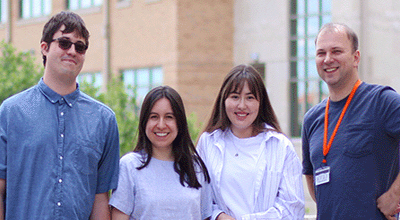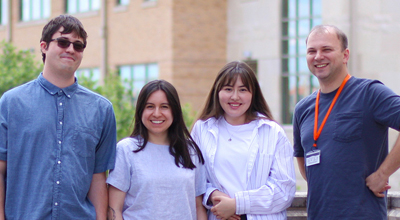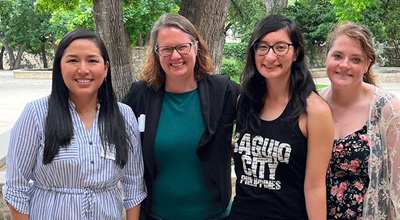The Department of Neuroscience, Developmental and Regenerative Biology (NDRB) at The University of Texas at San Antonio is a comprehensive academic unit that offers a B.S. degree in Neuroscience plus a Ph.D. degree in Developmental and Regenerative Sciences and a Ph.D. degree in Neuroscience.
Graduates of the degree programs supported by NDRB embark on a wide range of diverse career paths as health professionals, biomedical research scientists, biotechnologists, advocates for science public policy, and educators, among many others. Our undergraduate programs provide an outstanding foundation preparing students for graduate school, medical school, dental school, and other health-related careers.
NDRB is a vibrant department of scientific discovery and academic excellence. A key to our success has been our ability to recruit dynamic faculty at both the senior and junior levels, thus ensuring that our research and educational programs will continue to grow in excellence with an infusion of new ideas and energy.
Our mission is to conduct high impact internationally recognized research and to educate and train the next generation of leaders in biological sciences. As a department of neuroscientists, and developmental and regenerative biologists, we focus on understanding organismal, tissue and cellular function from molecules to behavior in health and disease.

Contact
Professor and Department Chair, BHC Director
Neuroscience, Developmental and Regenerative Biology
Jenny.Hsieh@utsa.edu272
Undergraduate Students
29
Graduate Students
39
Faculty
$11.2M
Research Expenditures
Interested in Applying to the DRS or Neuroscience Doctoral Program?
Applications are now closed for Fall 2023 admission. Applications for Fall 2024 will open September 1, 2023. Application deadline for Fall 2024 admission is December 1, 2023.
Interested in the NDRB Pre-Freshman Research Experience (NPRE)?
Applications for NPRE SUMMER 2024 Opens January 1, 2024. Program Dates: June 10–August 2, 2024. Final Application Deadline: March 31, 2024.
Annual Neuroscience Symposium
April 25, 2024 | BSE 2.102 Multipurpose Room | 9:30 am - 4:30 pm
Latest NDRB News
View All NDRB News
April 16, 2024
Alexey Soshnev receives $1 million CPRIT grant to decipher mechanisms of lymphomaPublished by UTSA Today

March 23, 2024
Alexey Soshnev: A focus on histone modifications in development and diseasePublished by ASBMB Today

March 13, 2024
Lacy Barton discovers new role of juvenile hormones in primordial germ cell migrationPublished by UTSA Today


